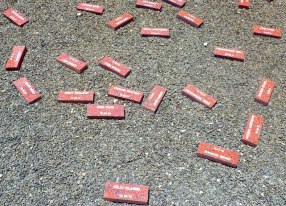When first looking at the Hector Pieterson Memorial outside of the museum, you are struck with the idea that something monumental must have happened here. This senseless loss shook the very roots of this community and country. These ideas invigorated them with the strength to overcome extreme adversity. However, the most significant concept that comes out of learning about Hector Pieterson is that he was a 13 year old child. He was a child that was on his way to pick up his sister from school and unfortunately was caught in the cross hairs of a stray bullet. His death was the catalyst for what is now known as the Soweto riots. His life and tragic death mark the underlying belief that regardless of age, gender, or skin color; “an individual life can change society” (Winnie Mandela).
Hector’s death became a symbol of the plight of the South African youth under the apartheid. Bricks in the courtyard of the building mark the countless lives lost with names and dates that fought for this very cause. For students, Hector’s death provided t hem a new political identity. They were able to provide tangible evidence to their already rising campaigns. “They are evidence of the human texture of historical experience” (Steven Biko). These individuals stood up for their language, nation, and land. They fought for a cause bigger than themselves and thread within the tapestry of the country they lived. Their plight helped to alter their society and force change onto a government that refused to value the idea behind human equality. “Each child was fighting a war that was not really theirs, but their parents” (Winnie Mandela). “It was through this evolution of their culture that their identity was fully discovered” (Steven Biko).
hem a new political identity. They were able to provide tangible evidence to their already rising campaigns. “They are evidence of the human texture of historical experience” (Steven Biko). These individuals stood up for their language, nation, and land. They fought for a cause bigger than themselves and thread within the tapestry of the country they lived. Their plight helped to alter their society and force change onto a government that refused to value the idea behind human equality. “Each child was fighting a war that was not really theirs, but their parents” (Winnie Mandela). “It was through this evolution of their culture that their identity was fully discovered” (Steven Biko).
“Soweto is everywhere” (Winnie Mandela). Hector Pieterson could not have achieved this type of uprising single- handedly. The students became the voice of the people. “Good moral character is not something that can be achieved alone. A culture must support the conditions under which self-love and friendships flourish” (Aristotle). These individuals believed that “in their country there should be no minority or majority, just people” (Steven Biko). This belief helped guide them during some of the country’s darkest moments into a land that now prides itself on its “democratic values, social justice, and fundamental human rights. South Africa continues to build a united and democratic nation that is able to take its rightful place as a sovereign state in the family of nations” (South Africa Const., preamble).
Hector Pieterson represents the piece of each of us that opposes the status quo and fights for the beliefs of your fellow brothers and sisters. His death helped to motivate thousands of students to take a stand against oppression that had consumed every bit of their lives. Their vision has led to a nation that prides itself on remembering its past while looking forward to its future. South Africa’s struggles live within each of us and motivate those within the international community to resist the oppressor whoever he or she may be. Hector Pieterson and the Soweto riots are proof that individuals can shape a society and create a vision filled with the commitment to human equality; but, can this united democracy exist under such diversity?
Tweet: “An individual life can change society.”

7 Responses to Hector Pieterson: An Individual Can Change Society